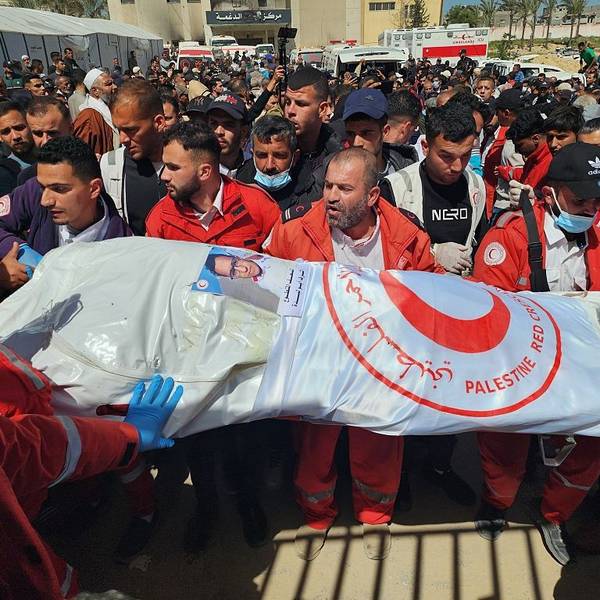Spain Investigates Claims of Israeli Crimes Against Humanity in Gaza
Former defence minister and six others accused over 2002 bombing that killed 15 people, mostly babies and children
MADRID - A Spanish judge today opened preliminary investigations into claims that a 2002 bomb attack on Gaza warranted the prosecution of a former Israeli defence minister and six senior military officers for crimes against humanity.
Judge Fernando Andreu agreed to investigate the deaths of 15 Palestinians, mostly babies and children, who died when the Israeli air force bombed a target in Gaza City.
He named the former defence minister Benjamin Ben Eliezer, the former defence chief-of-staff Moshe Ya'alon, the former air force chief Dan Halutz and four others.
Andreu, an investigating magistrate at the national court in Madrid, said evidence presented to his court showed the seven men may have committed the sort of crimes against humanity which Spain was bound by international laws to prosecute.
The magistrate accepted that the aim of the 2002 attack had been to kill Saleh Shehadeh, who he described as a suspected leader of "the terrorist group called Hamas".
But the Israeli air force appeared to have dropped such a huge bomb on Shehadeh's house that it was inevitably going to kill many other innocent people living nearby, Andreu said.
Israeli authorities had not replied to his request for information on the case after the Gaza-based Palestinian Centre for Human Rights presented a writ in the victims' names last April.
"These events can and should be investigated by Spanish courts, especially as there has been no reply at all to this court's request for relevant information from the State of Israel," he said.
"Between 11.30pm and midnight on July 22 2002, a one-ton bomb was dropped by an Israeli air force F-16 on the al-Daraj neighbourhood of Gaza City," Andreu said in a court document laying out the evidence presented to him. "The objective was the house of Salah Shehadeh, suspected of being a Hamas leader and the intention was to kill him.
"Salah Shehadeh's house took a direct hit from a highly powerful bomb, even though it was situated in one of the world's most densely populated residential zones," he said.
Most of the victims represented in the case were related to a Mr Mattar, who lived in the house next door.
"The two houses were less than two metres apart," the magistrate said. "As a result of the attack his home was destroyed and seven members of his family were killed."
Fifteen people, including Shehadeh, died and a further 150 were said to have been injured.
Andreu is acting under a doctrine that allows prosecution in Spain of alleged crimes against humanity or crimes such as terrorism or genocide, even if they are committed in another country.
Spanish magistrates have used the doctrine to pursue a number of current or former government leaders, but convictions or extraditions have been rare.
Spain's national court, which has tried and jailed human rights abusers from Latin American countries in recent years, has become a first stop for people wanting to bring cases under international human rights laws.
Israel's former prime minister Benjamin Netanyahu, said, "It's absurd; Israel is fighting against war criminals and they are charging us with crimes? There is nothing more ridiculous and absurd than them accusing us, a democracy legitimately protecting itself against terrorists and war criminals, of these crimes; it is absurd and makes a mockery out of international law," Netanyahu said.
An Urgent Message From Our Co-Founder
Dear Common Dreams reader, The U.S. is on a fast track to authoritarianism like nothing I've ever seen. Meanwhile, corporate news outlets are utterly capitulating to Trump, twisting their coverage to avoid drawing his ire while lining up to stuff cash in his pockets. That's why I believe that Common Dreams is doing the best and most consequential reporting that we've ever done. Our small but mighty team is a progressive reporting powerhouse, covering the news every day that the corporate media never will. Our mission has always been simple: To inform. To inspire. And to ignite change for the common good. Now here's the key piece that I want all our readers to understand: None of this would be possible without your financial support. That's not just some fundraising cliche. It's the absolute and literal truth. We don't accept corporate advertising and never will. We don't have a paywall because we don't think people should be blocked from critical news based on their ability to pay. Everything we do is funded by the donations of readers like you. Will you donate now to help power the nonprofit, independent reporting of Common Dreams? Thank you for being a vital member of our community. Together, we can keep independent journalism alive when it’s needed most. - Craig Brown, Co-founder |
MADRID - A Spanish judge today opened preliminary investigations into claims that a 2002 bomb attack on Gaza warranted the prosecution of a former Israeli defence minister and six senior military officers for crimes against humanity.
Judge Fernando Andreu agreed to investigate the deaths of 15 Palestinians, mostly babies and children, who died when the Israeli air force bombed a target in Gaza City.
He named the former defence minister Benjamin Ben Eliezer, the former defence chief-of-staff Moshe Ya'alon, the former air force chief Dan Halutz and four others.
Andreu, an investigating magistrate at the national court in Madrid, said evidence presented to his court showed the seven men may have committed the sort of crimes against humanity which Spain was bound by international laws to prosecute.
The magistrate accepted that the aim of the 2002 attack had been to kill Saleh Shehadeh, who he described as a suspected leader of "the terrorist group called Hamas".
But the Israeli air force appeared to have dropped such a huge bomb on Shehadeh's house that it was inevitably going to kill many other innocent people living nearby, Andreu said.
Israeli authorities had not replied to his request for information on the case after the Gaza-based Palestinian Centre for Human Rights presented a writ in the victims' names last April.
"These events can and should be investigated by Spanish courts, especially as there has been no reply at all to this court's request for relevant information from the State of Israel," he said.
"Between 11.30pm and midnight on July 22 2002, a one-ton bomb was dropped by an Israeli air force F-16 on the al-Daraj neighbourhood of Gaza City," Andreu said in a court document laying out the evidence presented to him. "The objective was the house of Salah Shehadeh, suspected of being a Hamas leader and the intention was to kill him.
"Salah Shehadeh's house took a direct hit from a highly powerful bomb, even though it was situated in one of the world's most densely populated residential zones," he said.
Most of the victims represented in the case were related to a Mr Mattar, who lived in the house next door.
"The two houses were less than two metres apart," the magistrate said. "As a result of the attack his home was destroyed and seven members of his family were killed."
Fifteen people, including Shehadeh, died and a further 150 were said to have been injured.
Andreu is acting under a doctrine that allows prosecution in Spain of alleged crimes against humanity or crimes such as terrorism or genocide, even if they are committed in another country.
Spanish magistrates have used the doctrine to pursue a number of current or former government leaders, but convictions or extraditions have been rare.
Spain's national court, which has tried and jailed human rights abusers from Latin American countries in recent years, has become a first stop for people wanting to bring cases under international human rights laws.
Israel's former prime minister Benjamin Netanyahu, said, "It's absurd; Israel is fighting against war criminals and they are charging us with crimes? There is nothing more ridiculous and absurd than them accusing us, a democracy legitimately protecting itself against terrorists and war criminals, of these crimes; it is absurd and makes a mockery out of international law," Netanyahu said.
MADRID - A Spanish judge today opened preliminary investigations into claims that a 2002 bomb attack on Gaza warranted the prosecution of a former Israeli defence minister and six senior military officers for crimes against humanity.
Judge Fernando Andreu agreed to investigate the deaths of 15 Palestinians, mostly babies and children, who died when the Israeli air force bombed a target in Gaza City.
He named the former defence minister Benjamin Ben Eliezer, the former defence chief-of-staff Moshe Ya'alon, the former air force chief Dan Halutz and four others.
Andreu, an investigating magistrate at the national court in Madrid, said evidence presented to his court showed the seven men may have committed the sort of crimes against humanity which Spain was bound by international laws to prosecute.
The magistrate accepted that the aim of the 2002 attack had been to kill Saleh Shehadeh, who he described as a suspected leader of "the terrorist group called Hamas".
But the Israeli air force appeared to have dropped such a huge bomb on Shehadeh's house that it was inevitably going to kill many other innocent people living nearby, Andreu said.
Israeli authorities had not replied to his request for information on the case after the Gaza-based Palestinian Centre for Human Rights presented a writ in the victims' names last April.
"These events can and should be investigated by Spanish courts, especially as there has been no reply at all to this court's request for relevant information from the State of Israel," he said.
"Between 11.30pm and midnight on July 22 2002, a one-ton bomb was dropped by an Israeli air force F-16 on the al-Daraj neighbourhood of Gaza City," Andreu said in a court document laying out the evidence presented to him. "The objective was the house of Salah Shehadeh, suspected of being a Hamas leader and the intention was to kill him.
"Salah Shehadeh's house took a direct hit from a highly powerful bomb, even though it was situated in one of the world's most densely populated residential zones," he said.
Most of the victims represented in the case were related to a Mr Mattar, who lived in the house next door.
"The two houses were less than two metres apart," the magistrate said. "As a result of the attack his home was destroyed and seven members of his family were killed."
Fifteen people, including Shehadeh, died and a further 150 were said to have been injured.
Andreu is acting under a doctrine that allows prosecution in Spain of alleged crimes against humanity or crimes such as terrorism or genocide, even if they are committed in another country.
Spanish magistrates have used the doctrine to pursue a number of current or former government leaders, but convictions or extraditions have been rare.
Spain's national court, which has tried and jailed human rights abusers from Latin American countries in recent years, has become a first stop for people wanting to bring cases under international human rights laws.
Israel's former prime minister Benjamin Netanyahu, said, "It's absurd; Israel is fighting against war criminals and they are charging us with crimes? There is nothing more ridiculous and absurd than them accusing us, a democracy legitimately protecting itself against terrorists and war criminals, of these crimes; it is absurd and makes a mockery out of international law," Netanyahu said.

